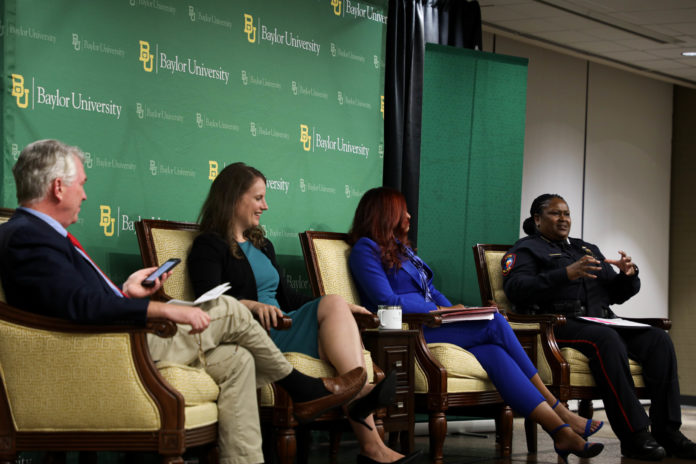
By Matt Kyle | Staff Writer
At the “Gender, Race and Justice: The Future of American Policing” event on Thursday, a panel of experts spoke about various issues within the American policing system. Panelists also spoke about reforms to the system, including police departments taking better accountability, training police to de-escalate situations and promoting engagement between officers and the community.
Panelists included Dr. Sheryl Victorian, the first female and first black police chief of the Waco Police Department; Ganesha Martin, a Baylor journalism graduate and expert in police reform who has worked in police departments; and Heather Rice-Minus, senior vice president of advocacy and church mobilization at Prison Fellowship, the nation’s largest Christian nonprofit serving prisoners, former prisoners and their families.
The event was co-sponsored by Baylor in Washington. Dr. David Corey, director of Baylor in Washington, said the event was put on with the intention of having experts discuss controversial issues in a civil manner.
Martin identified officer training as an issue within the policing system that needs reform. She said officers are “set up for failure” by the way they are trained to handle situations.
“When a person is nervous and they’re making furtive movements, then the officer is trained to de-escalate the situation for safety issues,” Martin said. “The officer is being trained that the moment you’re not hyper-vigilant, you will die. The structure needs to be changed to recognize and reinforce the humanity in that instance.”
Martin said in addition to de-escalation training, police departments need to work to better diversify their departments. She placed emphasis on having more female officers and said that in the past 20 to 25 years, only about 12% of officers have been women.
“If you look at study after study, it shows women use less force, women shoot less, women problem-solve more,” Martin said. “We’re involved in a movement called 30 by 30, and the idea behind 30 by 30 is to get at least 30% of women in policing by 2030, because that’s the tipping point for cultural change.”
Victorian said that policing is a male-dominated profession and that women only make up 13% of police officers and 3% of police chiefs across the country today. She said she is aiming to hire more female officers in addition to increasing racial diversity within the department so that the Waco Police Department is a better representative of the Waco community.
“We have long-term and short-term plans of being able to recruit minorities and those that represent the department,” Victorian said.
Victorian also said one of her priorities as police chief is to increase the number of positive interactions with the community so that officers and the community can understand one another’s perspectives. Victorian said she believes “relational policing” is the most effective way to improve community relations.
“There are tenants of relational policing that spell out the word TREAT,” Victorian said. “I feel like transparency, respect, engagement … and accountability builds to that last T, which is trust.”
All three panelists highlighted the importance of accountability within police departments. Victorian said that this accountability begins with department supervisors and executives and that departments need to do a better job of creating a culture where it is “OK to correct our fellow officers’ behavior and prepare our supervisors with the right knowledge, skills and abilities to be able to identify these behaviors.”
McAllen sophomore Alyssa Villarreal said she was interested in the discussion of the flaws within the system and how Martin said it was set up to fail. She said that conversation is important to have because the issues of inequality have become “so apparent” in the past year and it is important to understand the experiences of those different from you.
“When you see your brother or sister in Christ, that they are suffering, you have a responsibility and an obligation to support them,” Villarreal said. “Try your best to understand what you’re going through, even if you’re not the same.”





